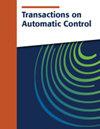连续时间线性二次调节的最优输出反馈学习控制
IF 7
1区 计算机科学
Q1 AUTOMATION & CONTROL SYSTEMS
引用次数: 0
摘要
经典的线性系统状态反馈线性二次调节(LQR)问题得到了广泛的研究。然而,动态输出反馈具有最优暂态性能的LQR问题仍然是开放的。其主要原因是观测器误差不可避免地导致闭环系统的非最优暂态性能。在本文中,我们提出一种最优动态输出反馈学习控制方法来解决未知动态线性连续系统的LQR问题。特别地,我们提出了一种新的内部动力学称为内部模型。与经典的$p$-copy内部模型不同,它由系统的输入和输出驱动,并且所提出的内部模型的作用是补偿观测器的瞬态误差,从而保证输出反馈LQR问题的最优性。提出了一种无模型学习算法来估计动态输出反馈控制器的最优控制增益。该算法不需要任何系统矩阵的先验知识或系统的初始状态,从而导致无模型LQR问题的最优解。最后以某飞机控制系统为例说明了该方法的有效性。本文章由计算机程序翻译,如有差异,请以英文原文为准。
Optimal Output Feedback Learning Control for Continuous-Time Linear Quadratic Regulation
The classical linear quadratic regulation (LQR) problem of linear systems by state feedback has been widely addressed. However, the LQR problem by dynamic output feedback with optimal transient performance remains open. The main reason is that the observer error inevitably leads to suboptimal transient performance of the closed-loop system. In this article, we propose an optimal dynamic output feedback learning control approach to solve the LQR problem of linear continuous-time systems with unknown dynamics. In particular, we propose a novel internal dynamics called the internal model. Unlike the classical $p$
求助全文
通过发布文献求助,成功后即可免费获取论文全文。
去求助
来源期刊

IEEE Transactions on Automatic Control
工程技术-工程:电子与电气
CiteScore
11.30
自引率
5.90%
发文量
824
审稿时长
9 months
期刊介绍:
In the IEEE Transactions on Automatic Control, the IEEE Control Systems Society publishes high-quality papers on the theory, design, and applications of control engineering. Two types of contributions are regularly considered:
1) Papers: Presentation of significant research, development, or application of control concepts.
2) Technical Notes and Correspondence: Brief technical notes, comments on published areas or established control topics, corrections to papers and notes published in the Transactions.
In addition, special papers (tutorials, surveys, and perspectives on the theory and applications of control systems topics) are solicited.
 求助内容:
求助内容: 应助结果提醒方式:
应助结果提醒方式:


